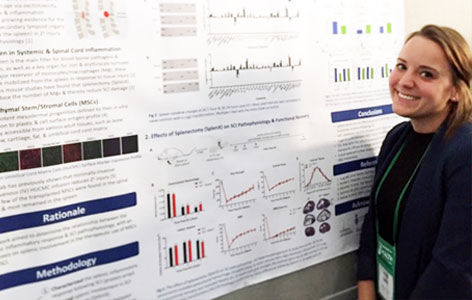
Conference: National Neurotrauma Symposium 2017, July 7-12, Alta, Utah, USA
Conference Highlight: Through the integration of clinical, translational and basic science, the annual National Neurotrauma Symposium (NNS) encouraged transdisciplinary discussion of central nervous system injury.
Conference Article: The annual NNS meeting attracts some of the most prominent and influential leaders in the field of neurotrauma. This year’s conference featured sessions on injury-induced autoimmunity, mitochondrial dysfunction, stem cell-mediated repair of the spinal cord and evolving concepts on secondary injury.
Especially interesting was a panel discussion titled, “Acute Spinal Cord Injury (SCI) and the Therapeutic Window: Are We Chasing Realistic Targets?”, with Drs. Michelle Hook (Texas A&M University), William Whetstone (University of California), J. Marc Simard (University of Maryland) and Linda Noble-Haeusslein (University of Texas at Austin). During this session, the panel engaged the audience through critical debate on the feasibility as well as the clinical efficacy of early interventions. Relatedly, this discussion was followed by a clinical trial update pertaining to four ongoing studies for spinal cord trauma, including Vertex Pharmaceuticals’ promising Phase 2b/3 SPRING trial and the Phase 2/3 RISCIS study. Focusing on cell therapy, Asterias Biotherapeutics showed the baseline demographics of spinal cord injury patients who were transplanted with oligodendrocyte progenitor cells, and Dr. Kim Anderson-Erisman (University of Miami) shared the progress of an autologous Schwann cell transplantation clinical trial.
On another note, Dr. Wassarman (University of Wisconsin) gave a compelling presentation on a novel model of traumatic brain injury in Drosophila, which enables large scale genetic screens in relation to injury pathology. There were also four excellent anniversary lectures by Drs. Wise Young (Rutgers University), John Povlishock (Virginia Commonwealth University), Edward Hall (University of Kentucky) and Alan Faden (University of Maryland).
Most importantly, the mid-day poster sessions enabled \stimulating discussion, invaluable feedback and plentiful networking opportunities for all participants.




